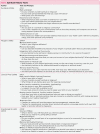Spiritual Assessment in a Patient With Lung Cancer
- PMID: 26328218
- PMCID: PMC4530115
Spiritual Assessment in a Patient With Lung Cancer
Abstract
CASE STUDY Mr. G., an 82-year-old retired European man, was diagnosed with stage 4 non-small cell lung cancer (NSCLC) and recently enrolled on a phase II clinical trial. He is married and has two adult children, who are very supportive. He and his wife described themselves as nonpracticing Catholics. He had never smoked, and there was no personal or family history of cancer. Fatigue was the main side effect from the clinical trial drugs, necessitating frequent periods of rest throughout the day and ultimately requiring dose reduction. His left leg was edematous and painful, and he was diagnosed with and treated for deep-vein thrombosis. Over time, these symptoms resolved, and Mr. G. enjoyed a fairly normal quality of life (QOL). He continued to do well for almost a year, but then his cancer progressed and his performance status began to decline. When offered treatment options, he elected to discontinue the clinical trial, take a break, and then initiate single-agent chemotherapy. Mr. G. was enrolled in a palliative care research study that provided patient-tailored education by an advanced practitioner (AP). The education addressed each QOL domain: physical, psychological, social, and spiritual. When the AP connected with Mr. G. during one of his clinic appointments, he appeared very concerned. He shared that he previously had lived in a communist country and now that he was in the United States, he was afraid of losing his insurance and having to stop treatment. The conversation was interrupted as he was called in for his appointment, yet he consented to talk about the matter further by telephone. The AP contacted Mr. G. the next day. He shared a glimpse of his childhood and experience in his homeland to try to explain his current fears. After reassuring him that his insurance would not be withdrawn, the AP asked whether he would be willing to talk about his life before coming to the United States more than 50 years ago. She wanted to assess where he was spiritually as a self-described nonpracticing Catholic. Mr. G. began by stating that he knew he was going to die of his lung cancer. He added that he did not know whether he was afraid of dying or believed in an afterlife, as he felt ambivalent about faith and religion. The AP learned that what gave his life meaning was his family. His "boys" were everything to him, and he did not want to be a burden to them or his wife. The AP listened and then encouraged Mr. G. to tell his whole story. As a child, he had lived in an occupied country in Eastern Europe during World War II. Mr. G. and his family spent over a year in a concentration camp. They slept on straw, their heads were shaved, and they all had lice. Men aged 18 to 40 were shipped to Russia to work in the copper mines, where many died of exhaustion. Most older men were killed, and he watched his grandfather die beside him. Horse-drawn buggies took dead bodies to mass graves, where lime was poured over them. Mr. G. had boils over his entire body from lack of nutrition. Though technically Catholic, Mr. G. did not ask God to save him; he had seen too much to believe that God would be involved. One day, he escaped with two other boys. With the help of a stranger, they crossed at night into Romania. They walked for miles into Hungary, where they found shelter in a convent for several weeks. The Mother Superior collected money so he could take the train to Budapest and arranged for him to stay in a Catholic home. From Budapest, he went to Austria, living in refugee camps until moving into an apartment of his own. Mr. G. attended college in Austria and later moved with his wife to the United States, where they raised two boys and owned a successful business.
References
-
- American Cancer Society. Atlanta, GA: American Cancer Society; 2014. Cancer facts & figures 2014.
-
- American Nurses Association. Silver Spring, MD: American Nurses Association; 2001. Code of ethics for nurses with interpretive statements.
-
- Anandarajah G, Hight E. Spirituality and medical practice: using the HOPE questions as a practical tool for spiritual assessment. American family physician. 2001;63:81–89. - PubMed
-
- Borneman Tami, Ferrell Betty, Puchalski Christina M. Evaluation of the FICA Tool for Spiritual Assessment. Journal of pain and symptom management. 2010;40:163–173. - PubMed
-
- Fitchett G. Assessing spiritual needs: A guide for caregivers (1st ed.) Lima, OH: Academic Renewal Press; 2002.
Publication types
LinkOut - more resources
Full Text Sources
Research Materials

